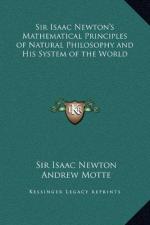|
This section contains 281 words (approx. 1 page at 300 words per page) |
 Sir Isaac Newton formulated a single law of gravitation based on Kepler's three laws of planetary motion.
Sir Isaac Newton formulated a single law of gravitation based on Kepler's three laws of planetary motion.
British Physicist and Mathematician 1642-1727
Considered one of the greatest scientists of all time, Isaac Newton was a British physicist and mathematician. Born in 1642, the year Italian mathematician and astronomer Galileo Galilei died, Newton's astounding list of contributions include discovering the law of gravity, designing a novel type of reflecting telescope, and writing the landmark work, The Mathematical Principles of Natural Philosophy (1687). This seminal volume spelled out the law of gravity, the laws of motion, and the universality of the gravitational force. It was Newton who first realized that white light is made up of the colors of the rainbow, made visible through the prism.
Newton's brilliance is very much in evidence today. For instance, the newton is a unit for force named after him. The Newtonian telescope is a type of reflecting telescope still in popular use. Newton's law of gravity and his laws of motion are at work, evidenced by the trajectory of a spacecraft circling Earth and by the behavior of all astronomical objects, such as the planets within the solar system. Newton's first law of motion is called the law of inertia; a second law concerns acceleration; while a third law states that for every action there is an equal and opposite reaction. Newton died in 1727, receiving recognition at the time for his brilliance.
See Also
Einstein, Albert (Volume 2);; Galilei, Galileo (Volume 2);; Gravity (Volume 2).
Bibliography
Newton, Isaac. The Principia: Mathematical Principles of Natural Philosophy, trans. I.Bernard Cohen and Anne Whitman. Berkeley: University of California Press, 1999.
Westfall, Richard. The Life of Isaac Newton. New York: Cambridge University Press,1993.
|
This section contains 281 words (approx. 1 page at 300 words per page) |


